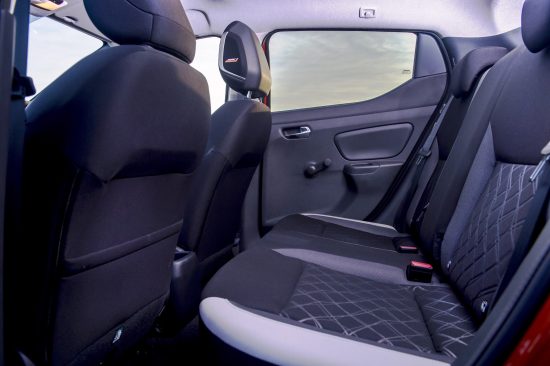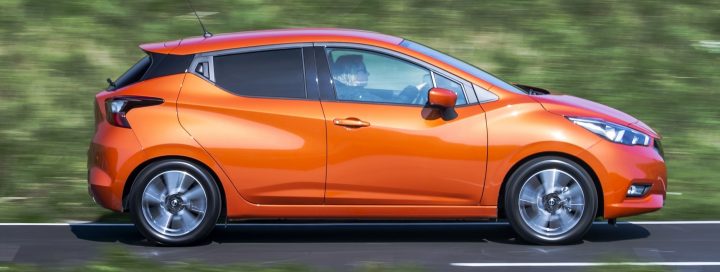The new fifth-generation Nissan Micra B-segment ‘Supermini’ sized hatchback range is now on sale, writes David Miles.
UK prices go from £11,995 up to £18,765 but the popular trend for personalisation options will push those prices steeply upwards.
The ‘supermini’ sector of the new car market is super-competitive with a huge choice of different brands such as the Ford Fiesta, Vauxhall Corsa, VW Polo, Skoda Fabia, SEAT Ibiza, Peugeot 208, Toyota Yaris, Hyundai i20, Suzuki Swift, MINI Hatch and of course the Micra’s Renault equivalents – the Clio and electric powered Zoe.
| Whereas Micras in the past have been compact, dumpy looking budget priced hatchbacks the new Micra is totally different size and style wise and much better equipped with a numerous in-control technology features. There has been a definite move to a premium look and feel for the interior and in common with its competitors there are lots of personalisation extra cost options. | The Micra over 34 years has amassed more than seven million sales worldwide with over 3.5-million of them in Europe. It was the first Japanese model to win the European Car of the Year title in 1993. The latest Micra is manufactured at Flins in France, a plant operated by Nissan Alliance partner Renault and it is the first Nissan passenger car ever to be built at a Renault plant in Europe, on the same lines as the Renault Clio and Zoe models. |
Currently the new Micra is available with three ‘downsized’ engines. There is the best selling 0.9-litre three-cylinder 90hp turbo petrol unit, a 1.0-litre normally aspirated 71hp petrol unit and a 1.5-litre four cylinder 90hp turbodiesel engine. All have five speed manual gearboxes.
There are the familiar Nissan five-model grades of Visia, Visia+, Acenta, N-Connecta and Tekna. Not all grades are available with all engines. Every new Micra comes with a two-tone interior and there are three different versions, one for Visia and Visia+, a second for Acenta and N-Connecta and a third for Tekna. Leather trim is an option on Tekna.
| Available only as a five door hatchback like most of its latest competitors the new Micra is longer, wider and lower with a longer wheelbase so it portrays a far more athletic look to its exterior design and the kerb appeal has improved hugely.There are lots of sharp styling lines which extend from the front to the rear with these creases actually extending into the front and faceted protruding rear light clusters. These work in harmony with the sculptured door panels, bonnet and roof.
The side profile has a wedge shape with a rising waistline and the handles for the rear doors are concealed in the C-pillars giving it the sleek appearance of a sporty three door hatch. The overall length is 3,999mm, some 174mm more than the previous generation Micra. Width has gone up by 78mm to 1,743mm and the height is 55mm lower at 1,455mm. The boot space is 300-litres which extends to 1,004-litres with the 60/40 split rear seat backs folded down. The boot is sensibly shaped to maximise its capacity but there is a high rear sill to load items over and into the boot. The interior feels a more grown up B-segment hatchback than the drab Micra offerings before. It’s roomier but the rear seat knee room is not the largest in its sector but fine for young couples without grown up children or ‘empty nesters downsizing moving from C-segment family hatchbacks. |
Specification highlights | |
| Visia grade comes with 15-inch steel wheels, front fog lights, audio system with two front speakers, Bluetooth compatible audio, six airbags, Lane Departure Warning and Intelligent Lane Intervention, Intelligent Emergency Braking with Pedestrian detection. Visia+ adds air-conditioning and Stop/Start Technology.
Acenta grade adds 16-inch steels/covers with free option of 16-inch alloys, body-coloured door mirrors and door handles, advanced drive assist display, 7-inch touchscreen display audio with four speakers, cruise control, two-tone upholstery, App integration and Apple Carplay. N-Connecta cars come with 16-inch alloy wheels, electric folding heated door mirrors, privacy glass, leather steering wheel, automatic air-conditioning, NissanConnect 7-inch touchscreen infotainment system. Tekna grade adds 17-inch alloy wheels, Nissan Intelligent Key with engine start button, rear view camera with rear parking sensors, BOSE Personal audio system with six speakers. In keeping with other brands there is also a number of exterior and interior personalisation packs depending upon the grade chosen. |
 The fascia is well laid out and the controls are easily used so for most people it will be an easy car to live with. There is a plentiful array of soft-touch plastic trim and mouldings and generally the car promotes a high quality interior ambience. It is a definite vast improvement over previous budget Micra offerings
The fascia is well laid out and the controls are easily used so for most people it will be an easy car to live with. There is a plentiful array of soft-touch plastic trim and mouldings and generally the car promotes a high quality interior ambience. It is a definite vast improvement over previous budget Micra offerings
My test car version was the 0.9-litre IG-T 90 three cylinder turbo petrol model with the top grade Tekna specification priced at a hefty – for its size, £17,435. But added to that was the £575 Echo Grey metallic bodywork paint, Vision+ pack at £550, Exterior Pack Plus with Energy Orange trim inserts for the alloy wheels and body panels plus the Interior Personalisation Pack of Energy Orange which again added trim inserts including a long orange leather type panel insert for the fascia panel and this costs £400.
 In total this test car weighed in at a costly £19,510 which puts it not only into to the larger C-sector class but also the even larger D-segment family cars. This engine, the best choice by far, but with a mid-grade Visia+ priced at £13,915 looks a far more realistic and competitive buy.
In total this test car weighed in at a costly £19,510 which puts it not only into to the larger C-sector class but also the even larger D-segment family cars. This engine, the best choice by far, but with a mid-grade Visia+ priced at £13,915 looks a far more realistic and competitive buy.
The 898cc turbo three-pot petrol unit produces 90hp and 150Nm of torque but from a relatively high 2,250rpm for these new generation lightweight triples. It’s responsive enough for in-town driving but on the open road acceleration performance doesn’t kick-in until that rpm level has been reached, but it does kick-in quickly at that stage and feels quite lively.
Overall the engine runs smoothly and makes light work at open road cruising speeds but the power delivery could be a bit more linear at low to medium speeds. The nicely weighted five speed manual gearchange allowed the engine to be kept in its powerband sweet-spot without too much fuss.
The turbo 90hp petrol engine is fuel frugal as well but not as fuel-sipping as the official figures suggest. The official Combined Cycle figure is 61.4mpg but on my week long road test using a mixture of long and short runs the figure was 46.8mpg and by no means was the Micra ever fully loaded. Top speed is 109mph with zero to 62mph taking 12.1-seconds.
There was good handling fluency with the new car, not as precise or as compliant as Fiesta but probably as good as the VW Polo. Poorer road surfaces produced a fidgety ride while road and tyre noise was evident. On smoother surfaces ride comfort was good and the ride more hushed.
The body control, cornering grip and agility all proved predictable, not always class leading, but a vast improvement on Micras of old.
Customers wanting a new ‘supermini’ sized hatchback should give the best Micra yet serious consideration but select the specification level with care otherwise top models look too expensive.
MILESTONES
New Nissan Micra Tekna 0.9 IG-T 90 manual £17,435 (£19,510 as tested)
Engine/transmission: 898cc, 3-cylinder turbo petrol 90hp, 150Nm of torque from 2,250rpm, 5-speed manual
Performance: 109mph, 0-62mph 12.1-seconds Combined Cycle 61.4mpg (46.8mpg on test)
CO2 104g/km, VED road tax £140 BiK company car tax 19%
Insurance group: 4E Warranty: 3-years/60,000-miles
Dimensions/capacities: L 3,999mm, W 1,743mm, H 1,455mm, boot/load space 300 to 1,004-litres, 5-doors/5-seats.
For: Best Micra to date, smart exterior styling, higher quality interior finish, more technical driving aids and infotainment specification, roomy up front, perky engine, generally a compliant ride, cheap to run.
Against: Top specification models are not as appealing due to their high price, not that roomy in the rear for legroom, high boot sill to load heavy items over, fidgety handling at low speeds over poorer road surfaces, real-life fuel consumption was well below the official figure.
© David Miles




